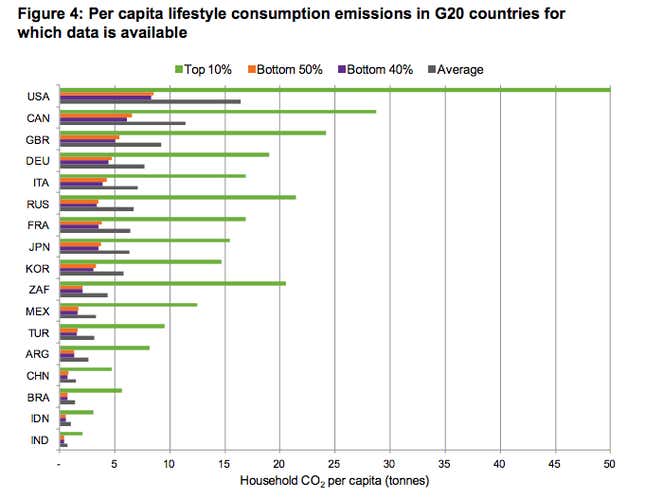Central to the global climate talks currently underway in Paris is the concept of fairness.
Most world leaders agree on the goal to limit future global warming to below 2ºC, but there are serious disagreements about who should bear the burden. Poorer countries argue that they haven’t yet gained the same benefits as rich countries from burning carbon in the past. Rich countries say that everyone has a responsibility to cut emissions in order for future targets to be met.
Now, a new report (pdf) by Oxfam has analyzed per capita carbon use, and found that almost half of the emissions generated by personal consumption are down to the wealthiest 10% of people. The poorest half of the world, about 3.5 billion people, collectively account for just a tenth of these emissions. In total, personal consumption generates around two-thirds of global emissions, Oxfam says, with the rest accounted for by groups like governments and the international transport industry.
Perhaps this doesn’t come as much of a surprise. In emissions, as in wealth, inequality is rife. And Oxfam accounts for “lifestyle consumption emissions” by allocating the pollution generated by goods and services to the countries where they are consumed, rather than produced, which amplifies the influence of richer countries. To this end, although China may be a huge carbon emitter, a large proportion of the goods it produces are actually consumed in rich Western countries.

Although the world’s wealthiest people can put a dent in emissions by voluntary changing their consumption patterns, this won’t be enough to save the climate, Oxfam claims.
“Increasingly members of the richest 10% are experiencing the impacts of climate change themselves, and are mobilizing to demand action from their governments,” it notes. “[Individuals’] choices are often constrained by the decisions of their governments in all sorts of areas, from energy to transport policy.” The organization adds that the only group that stands to gain from a weak or ineffective agreement in Paris is an even smaller elite within the elite: those with a direct financial interest in the fossil-fuel industry.
